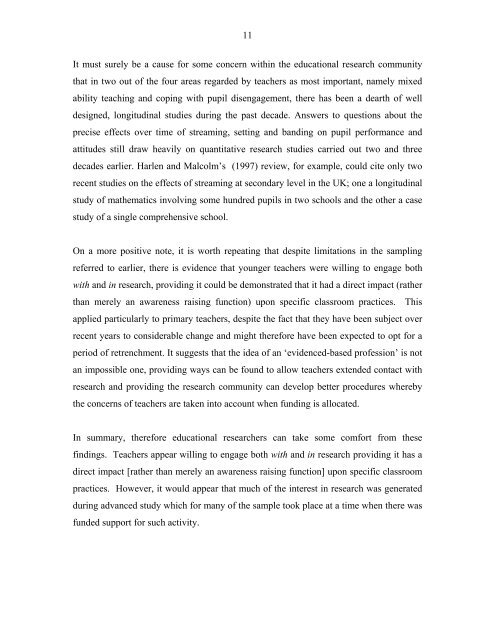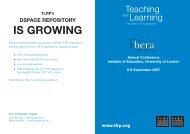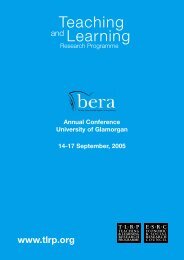Teachers - Teaching and Learning Research Programme
Teachers - Teaching and Learning Research Programme
Teachers - Teaching and Learning Research Programme
You also want an ePaper? Increase the reach of your titles
YUMPU automatically turns print PDFs into web optimized ePapers that Google loves.
11<br />
It must surely be a cause for some concern within the educational research community<br />
that in two out of the four areas regarded by teachers as most important, namely mixed<br />
ability teaching <strong>and</strong> coping with pupil disengagement, there has been a dearth of well<br />
designed, longitudinal studies during the past decade. Answers to questions about the<br />
precise effects over time of streaming, setting <strong>and</strong> b<strong>and</strong>ing on pupil performance <strong>and</strong><br />
attitudes still draw heavily on quantitative research studies carried out two <strong>and</strong> three<br />
decades earlier. Harlen <strong>and</strong> Malcolm’s (1997) review, for example, could cite only two<br />
recent studies on the effects of streaming at secondary level in the UK; one a longitudinal<br />
study of mathematics involving some hundred pupils in two schools <strong>and</strong> the other a case<br />
study of a single comprehensive school.<br />
On a more positive note, it is worth repeating that despite limitations in the sampling<br />
referred to earlier, there is evidence that younger teachers were willing to engage both<br />
with <strong>and</strong> in research, providing it could be demonstrated that it had a direct impact (rather<br />
than merely an awareness raising function) upon specific classroom practices. This<br />
applied particularly to primary teachers, despite the fact that they have been subject over<br />
recent years to considerable change <strong>and</strong> might therefore have been expected to opt for a<br />
period of retrenchment. It suggests that the idea of an ‘evidenced-based profession’ is not<br />
an impossible one, providing ways can be found to allow teachers extended contact with<br />
research <strong>and</strong> providing the research community can develop better procedures whereby<br />
the concerns of teachers are taken into account when funding is allocated.<br />
In summary, therefore educational researchers can take some comfort from these<br />
findings. <strong>Teachers</strong> appear willing to engage both with <strong>and</strong> in research providing it has a<br />
direct impact [rather than merely an awareness raising function] upon specific classroom<br />
practices. However, it would appear that much of the interest in research was generated<br />
during advanced study which for many of the sample took place at a time when there was<br />
funded support for such activity.

















